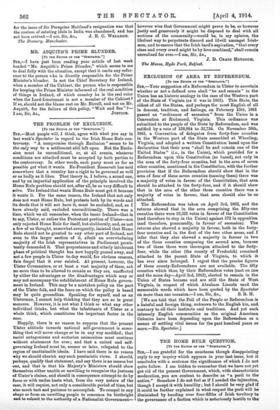THE PROBLEM OF EXCLUSION.
[To TIOI EDITOR O. IRE ..SPIOTASOZ:1 Sin,—Most people will, I think, agree with what you say in last week's Spectator in regard to the Irish Home Rule con- troversy. "A compromise through Exclusion" seems to be the only way to a settlement still left open. But the Exclu- sion must be unconditional, or, at all events, whatever conditions are attached must be accepted by both parties to the controversy. In other words, each party must as far as possible get what it wants. Ex-President Roosevelt has said somewhere that a country has a right to be governed as well or as badly as it likes. That theory is, I believe, a sound one, and by an impartial application of the principle involved the Home Rule problem should not, after all, be so very difficult to solve. The Ireland that wants Home Rule must get it because it wants it. For the same reason, the Ireland that not only does not want Home Rule, but protests both by its words and its deeds that it will not have it, must be excluded, and, as I have already said, excluded unconditionally. There was a time, which we all remember, when the lesser Ireland—that is to say, Ulster, or rather the Protestant portion of Ulster—not only rejected Home Rule for itself, but stubbornly, and, as not a few of us thought, somewhat arrogantly, insisted that Home Rule should not be granted to any other part of Ireland, not even to the larger section of it, albeit an overwhelming majority of the Irish representatives in Parliament persis- tently demanded it. That preposterous and utterly intolerant phase of political thought has now happily passed away, and not a few people in Ulster to-day would, for obvious reasons, fain forget that it ever existed. At present, however, the Ulster Covenanters, or at least a vast majority of them, ask no more than to be allowed to remain as they are, unaffected by either the advantages or the disadvantages which may or may not accompany the establishment of Home Rule govern- ment in Ireland. This may be a mistaken policy on the part of the Ulster folk, and the fears on which the policy is based may be quite groundless. Speaking for myself, and as an -Waterman, I cannot help thinking that they are so in great measure. However, it is not what I think or what any other individual thinks, but what the inhabitants of Ulster as a whole think, which constitutes the important factor in the ease.
Happily, there is no reason to suppose that the present Ulster attitude towards national self-government is some- thing that will never change or be in any way modified; that racial antagonisnis and sectarian animosities must continue without abatement for ever; and that a united and self- governing Ireland must be, sooner or later, relegated to the region of unattainable ideal,. I have said there is no reason why we should cherish any such pessimistic views. I should, perhaps, qualify that statement, and say there is no reason but one, and that is that his Majesty's Ministers should show themselves either unable or unwilling to recognize the justness of Ulster's claims, and should in consequence attempt to do by force or with undue haste what, from the very nature of the ease, it will require, not only a considerable period of time, but also much tact and patience to accomplish. To compel in any shape or form an unwilling people to renounce its birthright and to submit to the authority of a Nationalist Government—
however wire that Government might prove to be, or however justly and generously it might be disposed to deal with all sections of the community—would be, in my opinion, the likeliest way to perpetuate discord and illwill amongst Irish- men, and to ensure that the Irish bard's aspiration, "that every class and every creed might be by love combined," shall remain unrealized for ever.—I am, Sir, &e., The Manse, Hyde Park, Belfast. J. D. CRAIG HOUSTON.














































 Previous page
Previous page